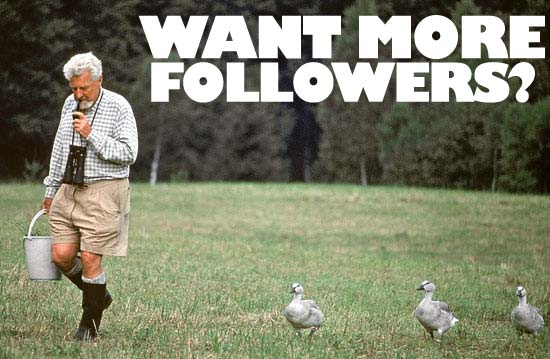Do you have enough followers to read this blog post?
It probably comes as no surprise to some of you that a few members of the KashFlow Krew are Twitterholics – around 50% of staff here use it, and Management Today kindly voted Duane one of the top 50 entrepreneurs on Twitter (coming above two Dragons’ Den dragons, no less…). Although we have a dedicated community manager (who takes care of Twitter, Facebook etc as well as our in-person events), several of us also chip in answering questions and posting interesting articles we stumble across as KashFlow. We recently abandoned using ‘name-tags’ (i.e. ^SB, ^PJ etc) at the end of posts, instead deciding that our voice on Twitter should be consistent enough that it doesn’t matter who posts what.
I recently came across a slightly unsettling tweet by a journalist friend pictured below –
I followed the link, out of curiosity, presuming it must be a social media manager role. In fact, the opening is for an online entertainment editor. I’m confused as to why a strong presence on social media is so important for such a role for a couple of reasons. Firstly, it conflates a person’s individual presence on the internet with their professional identity. In the same way that people feel the need to assert that ‘tweets are my own, not those of my employer’, an employer cannot assume that employees are willing to pimp out things they’ve written to those following them. That said, one might question whether someone unwilling to do so is demonstrating a lack of pride in their work, and is thus unsuitable for the job…
As I’ve hinted at above, Twitter is usually a personal thing – some people spend years amassing followers through dedicated posting of insightful content or witty remarks (or pictures of cats wearing hats and inanimate objects that look like faces). There’s no denying that this usually takes time. If an employer expects an employee to have such a devoted following, the implication is that they’ll be using that account during the day. This, more or less, gives them a free pass to spend time at work on Twitter under the guise of it being work. I imagine it takes a lot of self control to resist replying to personal messages. Even if the individual is diligent and hard working, the lines between tweets that are ‘work’ and those that are ‘personal’ may become blurred beyond recognition.
One might reasonably expect that a really dedicated community manager (which, as I mentioned above, the role in question is not. However, I expect this trend to become widespread very quickly…) would put all their efforts, during the day at least, into building up the company Twitter page they’re in charge of, rather than their own. This raises a question – should you hire the person who has 10,000 followers on their personal account and manages a company account with 600 followers or vice versa…?
There’s no denying that Twitter has had an impact on work/life balance – of the five of us on the KashFlow marketing department, three of us found our jobs here through Twitter. Patrick, our head of marketing, even went as far to say that ‘every penny I’ve earned in the last three and a half years has come about through Twitter.’ Does this mean that Twitter, rather than something like LinkedIn (where ‘connections’ are all too often nothing more than strangers looking to boost their numbers), is becoming a more authentic measure of people’s networks? People who put out job ads like the one above seem to think so. I just hope they’re making sure applicants haven’t paid for followers…
As ever, we’re interested to hear your thoughts on this subject – is being well connected an asset to you? And how highly does it rank in your list of desirable traits in potential hires?


